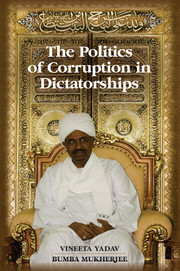The Politics of Corruption in Dictatorships
Langue : Anglais
Auteurs : Yadav Vineeta, Mukherjee Bumba

This book analyzes why some dictators find it in their self-interest to curb corruption.
The Politics of Corruption in Dictatorships studies how institutional and social factors influence corruption in dictatorships. Dictatorships are often synonymous with high levels of corruption, yet Vineeta Yadav and Bumba Mukherjee argue otherwise. The authors ask why corruption has declined in some but not other authoritarian regimes. What are the main political factors that drive some autocrats to curb corruption? The book explores the role that business mobilization can play in reducing corruption under some conditions in dictatorships. It investigates how political competition for an elected legislature affects the incentives of dictators to engage in corruption. The study relies on case studies from Jordan, Malaysia, and Uganda. The book is accessible to a wide audience without requiring sophisticated statistical training.
1. Introduction; 2. Geographic concentration and political mobilization by small and medium-sized business firms; 3. SME business association, multiparty legislature, and corruption; 4. Geographic concentration and national SME association in autocracies: the empirical evidence; 5. Empirical analysis of legislative institutions, SME firms, and corruption in autocracies; 6. Jordan: institutional change and corruption; 7. Malaysia: SME mobilization, and corruption; 8. Uganda: the contrarian case; 9. Conclusion and implications.
Vineeta Yadav is an Associate Professor of Political Science at Pennsylvania State University. Her research interests include studying how institutions influence economic development, business-politics, judicial politics and, politics of India, Brazil, and China. She was a Post-Doctoral Fellow at Princeton University, New Jersey. She is the author of Political Parties, Business Groups, and Corruption in Developing Countries (2011) which won the 2013 Leon Epstein Outstanding Book Prize by the APSA Political Organizations and Parties Section, the 2012 Rosenthal Prize by the APSA Legislative Studies Section, and received an Honorable Mention for the 2012 best book award from the APSA Comparative Democratization Section. She is also coauthor of Democracy, Electoral Systems, and Judicial Empowerment in Developing Countries (2014).
Bumba Mukherjee is a Professor of Political Science at Pennsylvania State University. His research interests include studying how political institutions affect monetary policy and financial markets, the political economy of financial crises, the impact of democratic politics on trade protection, the design and effect of international institutions, and statistical methodology. He was a Visiting Research Scholar at Princeton University, New Jersey and a Visiting Fellow at the Kellogg Institute, University of Notre Dame, Indiana. He is the author of Globalization, Democracy and Trade Policy in the Developing World (forthcoming) and, coauthor of Democracy, Electoral Institutions, and Judicial Empowerment in Developing Countries (2014).
Bumba Mukherjee is a Professor of Political Science at Pennsylvania State University. His research interests include studying how political institutions affect monetary policy and financial markets, the political economy of financial crises, the impact of democratic politics on trade protection, the design and effect of international institutions, and statistical methodology. He was a Visiting Research Scholar at Princeton University, New Jersey and a Visiting Fellow at the Kellogg Institute, University of Notre Dame, Indiana. He is the author of Globalization, Democracy and Trade Policy in the Developing World (forthcoming) and, coauthor of Democracy, Electoral Institutions, and Judicial Empowerment in Developing Countries (2014).
Date de parution : 12-2015
Ouvrage de 323 p.
15.2x22.9 cm
Date de parution : 12-2015
Ouvrage de 336 p.
16.7x23.5 cm
Thème de The Politics of Corruption in Dictatorships :
© 2024 LAVOISIER S.A.S.



